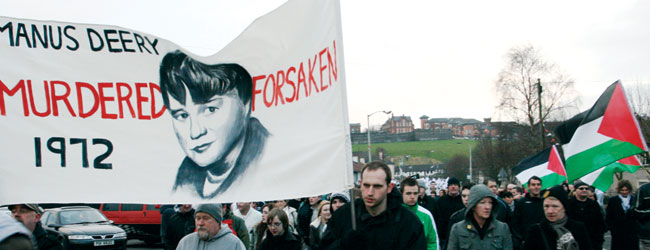4 March 2011
Bloody Sunday 2011 | The last march
Seeking justice for Ballymurphy and Manus Deery
 “BLOODY SUNDAY,” Gerry Adams boomed across Guildhall Square in Derry on January 30th, “IS the defining story of the British Army in Ireland.”
“BLOODY SUNDAY,” Gerry Adams boomed across Guildhall Square in Derry on January 30th, “IS the defining story of the British Army in Ireland.”
The Sinn Féin president was addressing a crowd that numbered as many as 30,000 who turned out to remember the 14 killed and many more wounded on Bloody Sunday by soldiers from the British Army’s elite Parachute Regiment on January 30th 1972.
This year’s event was declared by the majority of Bloody Sunday families to be the last march after the withering Saville Report published on June 15th last year finally found the British Army culpable for the unprovoked massacre of the civil rights marchers by the paratroopers. Saville also found that there was a subsequent cover-up by the British Army and British Government of lies and false charges against those shot on Bloody Sunday.
This year, the tens of thousands marched, as they have done for the previous 38 years, in a show of solidarity with the families of the dead and wounded.
People from Derry, from across the North, from throughout Ireland and from mainland Europe, England and the United States marched with common purpose.
In his remarks that carried across the same square that was packed with people last June to hear the Saville Report outcome, Gerry Adams was rebuking British Prime Minister David Cameron who told the British parliament on that day last year that “the story of Bloody Sunday was NOT the defining story of the British Army in Ireland”.
Gerry Adams countered, ““Bloody Sunday IS the defining story of the British Army in Ireland,” and the cheers of the thousands gathered in Derry drowned out once more the apologists in Westminster. They believed Adams rather than Cameron.
As the Sinn Féin president spoke, relatives of the 11 Ballymurphy people killed in August 1971 by the same Parachute Regiment that carried out the Derry massacre flanked him on the platform.
Also on the march were the families of five people gunned down in July 1972 by paratroopers in Springhill, west Belfast.
And the family of young Manus Deery, the 15-year-old schoolboy cut down by a British sniper carried their own banner on the march.
Adams is right. Bloody Sunday is the defining story of the British Army in Ireland and it was fitting that on the last Bloody Sunday commemoration march he reminded us of the role of the Parachute Regiment as “frontline assassins used by the British elite and the repression that was suffered by those people who stood up against repression”.
Briege Voyle, whose mother Joan Connolly was one of those killed in the Ballymurphy Massacre, called for continued support for the families as they seek justice for their loved ones.
Representatives of the Ballymurphy campaign had travelled to Derry for the publication of the Saville Report to show solidarity with the people of Derry.
“It was an honour to be here on that day and share on your moment,” said Briege Voyle said. “I live in hope that one day you will be with the Ballymurphy families as we celebrate our day of innocence. Until then, our fight for the truth will go on.”
She blasted those who claim that another inquiry like Saville would be too expensive, saying: “No cost compares to that of the loss of a loved one. And when it happens unlawfully at the hands of the state, the Government owes the families justice.”
Pat Quinn, whose brother Frank died in Ballymurphy, made the group’s objectives clear.
“We want a statement of innocence, an independent international investigation and an apology from the British Government. To achieve this we need to get the story out there and make people aware.”
As the light faded and darkness crept over the throng, John Kelly, brother of Michael Kelly, read out the names of the Bloody Sunday dead as well as the names of the wounded. A solemn yet thunderous applause reverberated around Guildhall Square.
Instead of the traditional minute’s silence, Kelly called for a minute of hand-clapping to celebrate the victory of the families.
Gerry Duddy spoke the words, “Our victory is your victory,” and the applause rumbled on.
This may have been the last march but the spirit and determination coupled to the thirst for justice will see the Bloody Sunday weekend become a platform for those like the Ballymurphy families as they fight for their truth and their justice.
Follow us on Facebook
An Phoblacht on Twitter
Uncomfortable Conversations

An initiative for dialogue
for reconciliation
— — — — — — —
Contributions from key figures in the churches, academia and wider civic society as well as senior republican figures




